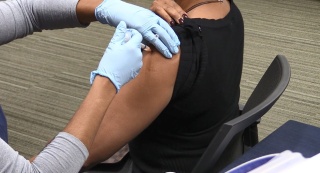Toiya Honore
toiya.honore@heart.org
469-774-8785
American Heart Association provides resources to help keep people flu free
(Black PR Wire) Dallas – The American Heart Association, the leading voluntary health organization devoted to a world of longer, healthier lives, is helping to keep families and communities safe from the flu by providing facts, resources and encouraging people to get a flu vaccine.
“Getting the flu vaccine is especially important this year. If you get the flu, you may need to be hospitalized, in this time of COVID-19, in an already overwhelmed healthcare system. Get your flu shot. Avoid getting the flu. Stay out of the hospital due to the flu,” said Eduardo Sanchez, M.D., M.P.H., FAAFP, American Heart Association chief medical officer for prevention and former commissioner of health for the state of Texas. “In a normal year, the flu is serious and can even cause death. The flu vaccine can keep you out of a hospital.”
While it is important for almost everyone six months and older to get a flu vaccine, it’s especially important for those at highest risk:
- Seniors and people with underlying risk factors such as heart disease, stroke and diabetes, among others. According to the Centers for Disease Control (CDC), those 50 years-old and older, living with one or more chronic conditions, are at high risk for the flu. Those who aren’t vaccinated are six times more likely to experience a heart attack
- Children, especially those who are under 5 years-old and those who are back in school. Children who are vaccinated are 74% less likely to be hospitalized due to the flu.
- Pregnant women – those who are vaccinated are 40% less likely to be hospitalized due to the flu.
According to the CDC, people who are Black or Latinx may be at increased risk for the flu and are least likely to get the flu shot. Over the past 10 flu seasons, non-Hispanic Black people were hospitalized at the highest rates and Latinx people were hospitalized at the third highest rates for the flu. Native Americans were second highest.
Some people have misinformation and concerns about the flu vaccine, causing them to skip it altogether. Here are some facts:
The vaccine does not cause the flu.
The flu vaccine cannot cause the flu. It may cause very mild side effects. The most common are soreness, swelling or redness on your arm near the site of the shot that might last only 1 or 2 days. However, the mild symptoms you might experience from the vaccine are much less severe than the flu itself.
It is safe and effective and easy to access.
The flu vaccine is safe and effective for preventing the flu, and is easy to get at places that are taking extra safety measures like:
- your doctor’s office,
- pharmacy, and
- some employers that are providing drive-thru vaccinations.
It is accessible even without insurance.
Many community pop-up vaccination sites, federally funded programs, local health departments, community health centers and some places like churches and community centers offer the vaccination at no cost for those who qualify.
It is not too late to get vaccinated.
Flu season typically peeks between December and February, so getting the vaccine now is better than waiting. You need at least two weeks for your body to develop antibodies to the virus. However, being vaccinated anytime during flu season is better than not at all.
“No one wants the flu. The best way to keep your family and yourself safe from the flu is by getting the flu vaccine and as with COVID-19 prevention, wearing a mask, washing your hands often, and social distancing helps,” said Dr. Sanchez. “Don’t forget to take your mask when you go for your flu vaccine.”
The American Heart Association’s flu vaccine campaign is made possible nationally in part by generous support from the Anthem Foundation and Sanofi Pasteur.
For more flu information and resources, visit heart.org/fluprevention.
For Media Inquiries:
Toiya Honoré, Toiya.honore@heart.org, (214) 706-1456

